
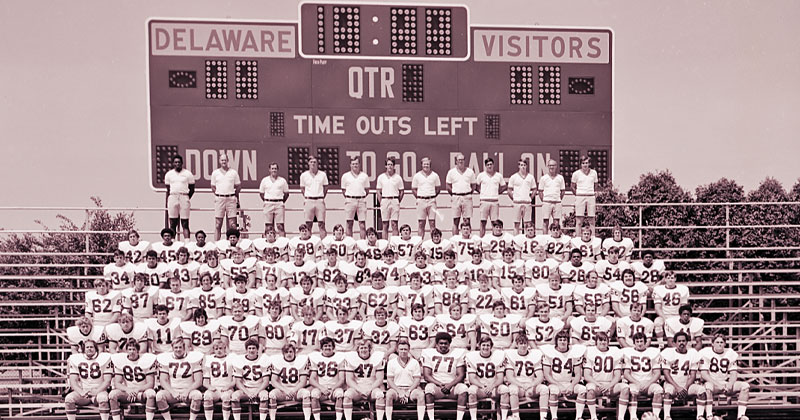

Smells like team spirit
UD's 1972 football team looks back on their undefeated season
August 30, 2022
It was the era of Nixon and ’Nam, of protests and countercultural movements. And somewhere, somehow, in a small, placid town, a college football team forgot how to lose.
There we were in Sports Illustrated. And on all the national nightly news channels. “Their official name is the Fightin’ Blue Hens, but the University of Delaware football team is anything but chicken,” a Nov. 20, 1972, TIME article began.
That year, Delaware Football would boast its fifth undefeated season in program history. The 1972 victory would come on the heels of the near-perfect ’71 season, when the Hens suffered one agonizing loss but gained much praise: They were voted the nation’s top college division team by both the Associated Press and United Press International, received the fourth consecutive Lambert Cup for mid-sized Eastern colleges and won yet another Boardwalk Bowl (then the equivalent of a national championship title).
Astonishingly, 1972 would prove even better. Fifty years later, players from that historic season look back on their milestone year and their unfailing ability to touch down on greatness.
The other undefeated seasons include: 1941 (7-0-1), 1942 (8-0), 1946 (10-0) and 1963 (8-0).
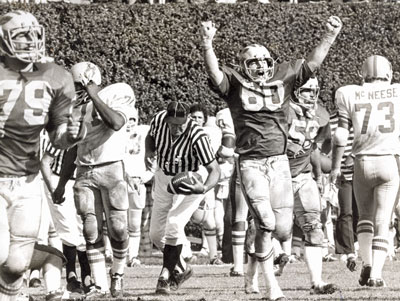
Dan Morgan, BE74, offensive tackle: As a student, you want to go where you’re going to play, and you want to go where you’re going to win. Delaware won. Our 1971 team led the country in scoring, running the ball. We did it all. Our defense was younger, but the next year, they were the old, experienced ones, and nobody could get first downs on us, let alone score points.
Bob Depew, AS72, defensive end: We won for the same reason any team wins. We had good players and we were well coached. We played with a lot of confidence.
The team attributes much of its success to late Head Coach Harold “Tubby” Raymond, who would amass 300 victories and a loyal following over his nearly 50-year UD career.
Ed Clark, ANR76, linebacker: Tubby was short in stature but big in life. Bigger than life. He knew how to recruit and put teams together. You never questioned his thought process.
Robert Cvornyek, AS75, offensive tackle: It’s no secret that he was a student of psychology.
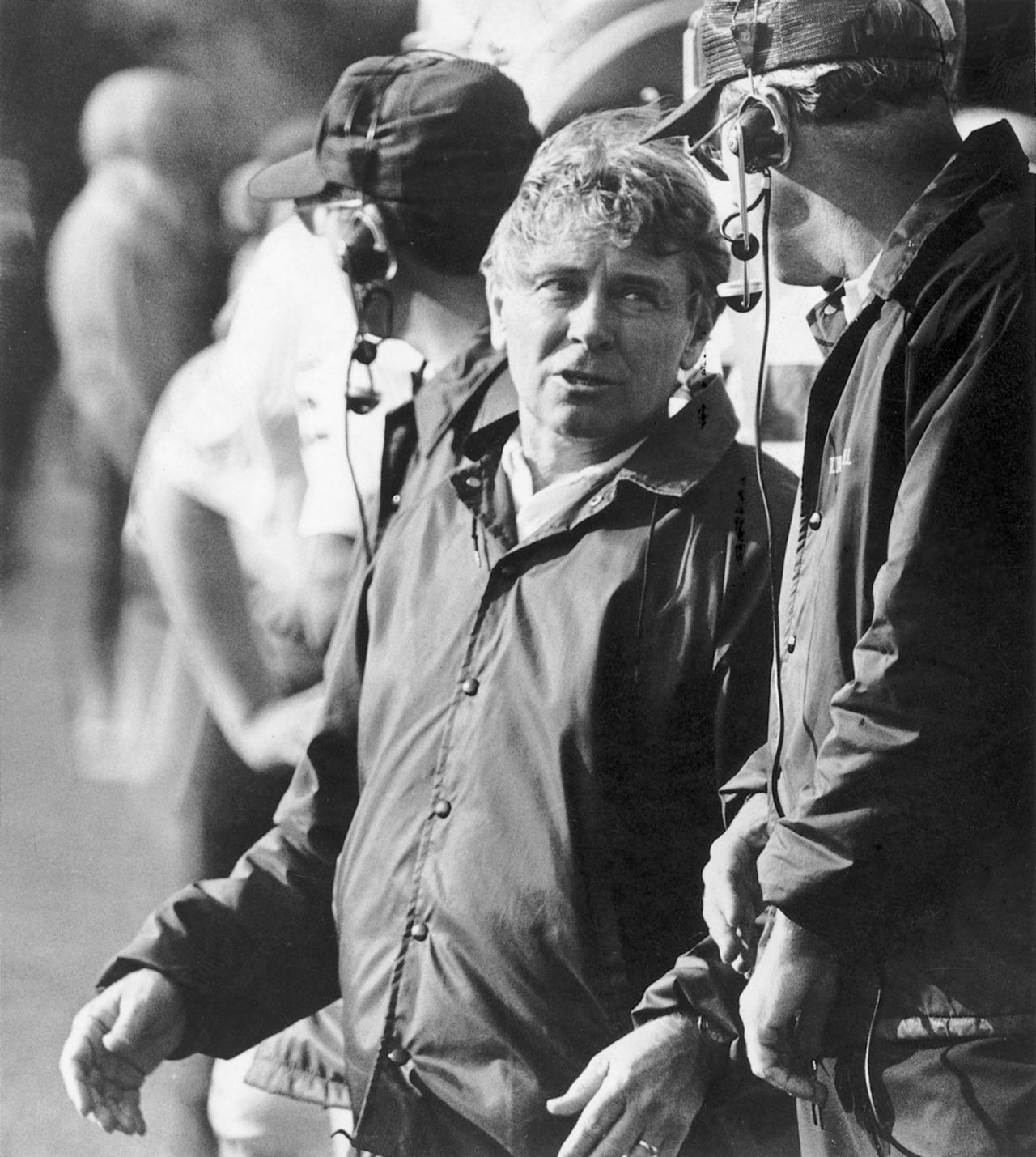
Depew: His Friday afternoon and pregame Saturday talks were quite effective. I don’t know how to describe it, but you had to be in the locker room to feel the excitement and how it built to a crescendo and then boom, you go out onto a field and there’s 20,000 people in the stands, and it was just a wild, crazy atmosphere. It was really a lot of fun.
Morgan: Tubby was an artist. Even when he drew his plays, the little circles were perfect. And we were catching everyone’s imagination with our Wing-T [offense]. People knew we were going to run that play, yet they had such a hard time stopping it.
Scott Reihm, BE75, quarterback: There’s several aspects to the Wing-T, but the main thing is deception. We’d have motion, and the blockers all had angles—trap, cross-block. Never zone block, which they mostly do now. I still remember all the numbers and plays. We had a particular play—the 933-counter crisscross—where I hand off to the right halfback, he hands off to the left wingback, and I trail the wingback who then has the option of pitching to me. You got three people handling the ball. That was real successful.
While the Fightin' Blue Hens battled teams across the Eastern Seaboard, their greatest rivalries played out against teams from the City of Brotherly Love. In 1971, on a hot Homecoming afternoon honoring Delaware’s 1946 Cigar Bowl team, Temple and Delaware played a nailbiter in Newark, with Delaware leading, 27-19. On a third down pass, with less than five minutes left, an injured Roger Mason, AS73, ran to the eight-yard line before a Temple defender knocked the ball loose. Four plays later, the game was over, 32-27, Delaware's only loss of the season One year later, on the rainiest day of 1972, the Blue Hens found themselves on enemy turf.
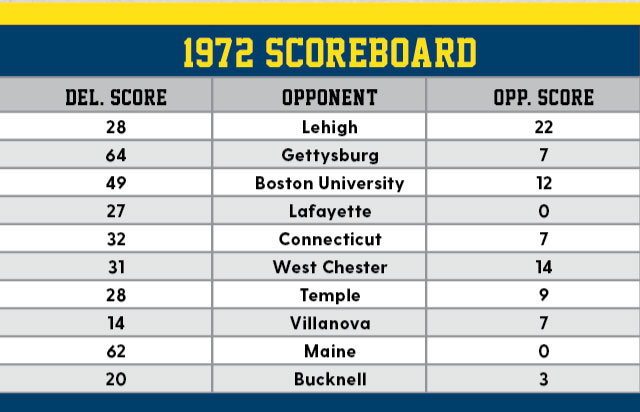
Mason, halfback: I woke up thinking, “I hope they don’t cancel this game.” It was a torrential downpour in Philly. Their quarterback said, “Delaware would never beat Temple.” Those headlines were plastered all over the locker room, and I sat there thinking, “We’ll see.”
Depew: After we won, a newspaper put [the Temple quarterback’s] quote beside his new [1972] quote: “It’s always tough to lose to Delaware.” That said it all.
Mason: I concentrated on the game and just ran like a fool, and they kept giving me the ball. I was picking up three, four yards, first down; three, four yards, first down. My line in front of me was the real reason for our success.
Depew: We just ground them down. Roger Mason gained 182 yards on 45 carries. I don’t think they thought we could do that. I’m not sure we thought we could do that so effectively. It was revenge for the year before, which was the difference between us having back-to-back undefeated seasons. We came out of that game thinking nobody can beat us.
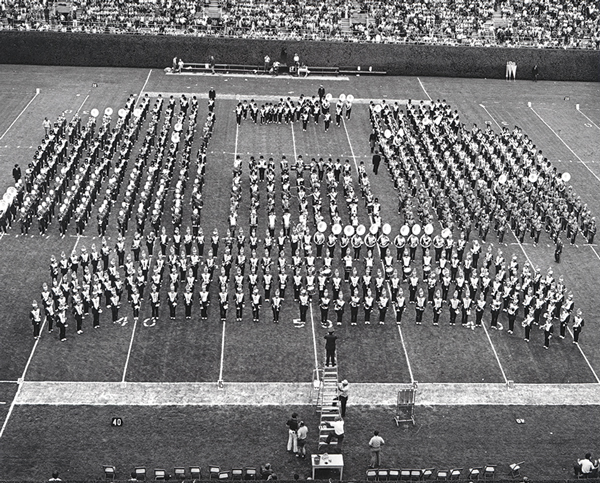
Reihm: The next week, we played Villanova up at their stadium. It was 7-7, and we had a drive in the fourth quarter. It was 3rd and 10. We ran a waggle, which was basically a fake. I turned my back and got to the center line, and I had the option of running or hitting the tight end for a touchdown, which Vern Roberts, EHD76, masterfully caught. It was one of the best games we played.
Cvornyek: In practices leading up to ’Nova, we heard a lot about a wide receiver they had named Mike Siani, who was eventually drafted by the Oakland Raiders. Tubby was interested in neutralizing Siani with our safety [Johnny Bush, BE74]. I got the feeling that Bush had a heavy weight on his shoulders the whole week. Then game time comes, and you wonder if he’ll be able to execute, and he did. We won that game as a team, but in this instance, there may have been an individual player who carried an uneven burden, and that was Johnny Bush.
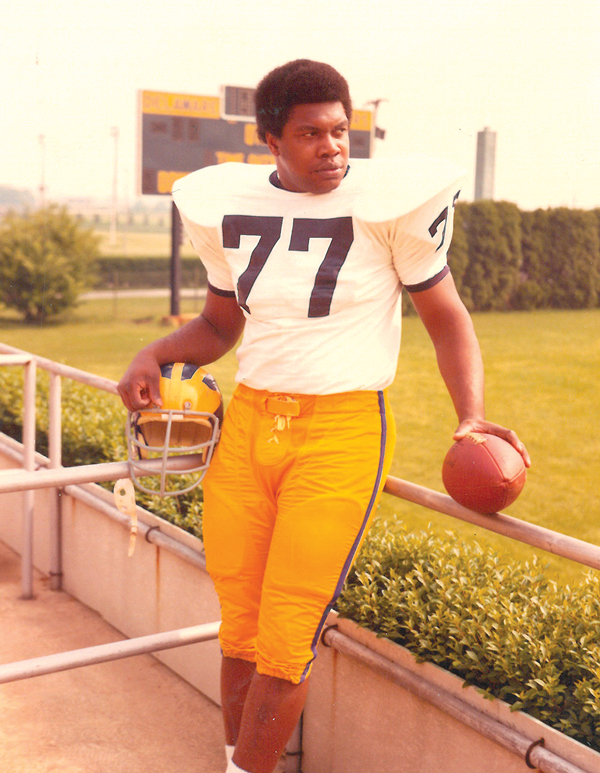
Clark: Our success really came down to the leadership of the team. Joe Carbone, BE73, and Bobby Depew as defensive ends. One was All-American for football, one for scholastics. And Dennis Johnson, BE73 [who passed away in 1997]. Everybody looked up to Dennis. He was the anchor. He was a guy you never wanted to disappoint because he was that good.
Reihm: Dennis was in my same pledge class at Theta Chi. He was a gentle giant. Off the field, he was the kindest soul. On the field, he was a terror.
Morgan: When we got here, the football team had only been desegregated a year or two, but we didn’t know that. The only issue we had was the music in the locker room. We had the old 45s, and there was one song we’d play every day. Finally, one of the guys said, “Can we have something else? Play some Motown.”
Cvornyek: “Maggie May” was always on. It’s been 50 years, but as soon as I hear Rod Stewart, it takes me right back to the locker room.
After the season ended, the 1972 team had the opportunity to play the Boardwalk Bowl for the fifth year in a row. They declined.
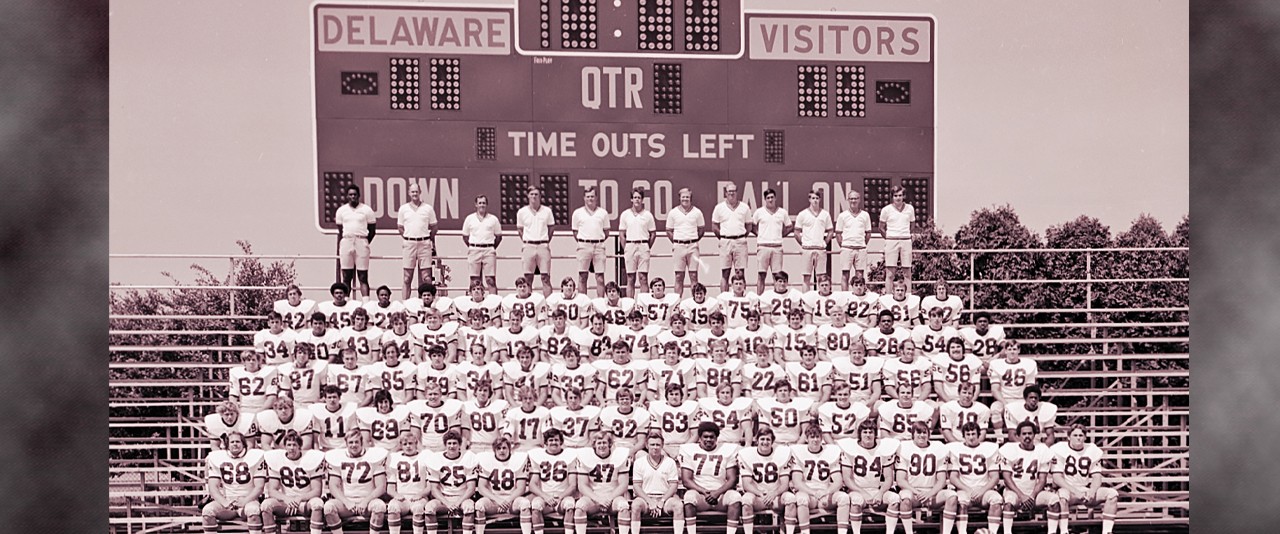
Morgan: We had been in the Boardwalk Bowl for four straight years, and we’d won all four. And the last game we won 72-22. The national papers put our score in the basketball section because it was so high. We all thought we maybe deserved a shot at something else, something a little bigger.
Reihm: We met as a team on the Sunday after our last game. As underclassmen, we looked to the seniors for their leadership.
Team captain Dennis Johnson would release the following statement: “The 75 members of the 1972 University of Delaware football team have voted unanimously not to play in the December 9th Boardwalk Bowl for the following reasons: First, the current system does not provide an opponent commensurate with our national ranking, and second, the NCAA allows only 38 players to dress for the game, and that does not convey a team effort. It was this team concept that enabled our team to finish with a 10-0 regular season record.”
Clark: You never know you’re making history while it’s going on. You get so focused on playing the next game and then the next game, and suddenly you’re saying, “We’re 7 and 0.” “Holy shit, we’re 8 and 0.” Then you’re really playing for something that could be a mark in Delaware history for years and years to come. It’s about teamwork and leadership. Once you’re in the locker room, you know you depend on 40, 50 guys. In business, it’s the same way. You can’t be the lone ranger. You gotta bring everybody together. That’s what football taught: Be a good teammate and look out for the other guy all the time.
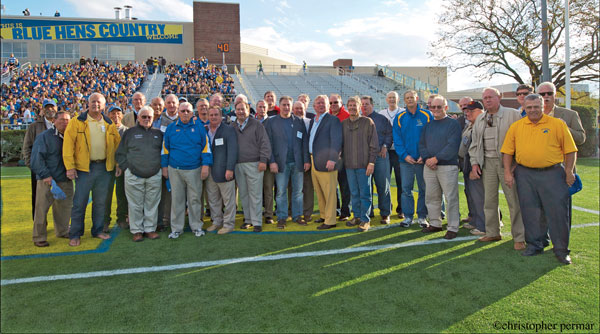
Cvornyek: There was a constant reminder from Tubby that this was a critical point in your life. And if we win this championship, this was going to be a defining moment in our life. When you’re 18, 19, you don’t think of defining moments because there’s so much of life ahead of you. Now that I look back after 50 years, I understand what he meant: There’s something larger that you need to be a part of. In 1972, it was football, but as you move through life, it becomes other things—family, social justice, those bigger, broader issues that need your participation.
Morgan: You really learn the value of synergy. As you work together, you see how the sum of the parts are so much greater than the individual pieces.
Depew: Aside from the championships and the media attention, that’s what I remember most. How football was an integral part of our education; how it shaped work ethic, taught resiliency, how to deal with disappointment and inevitable failure. There were so many attitudes and behaviors we could learn from Delaware Football, and we did.
Contact Us
Have a UDaily story idea?
Contact us at ocm@udel.edu
Members of the press
Contact us at 302-831-NEWS or visit the Media Relations website


